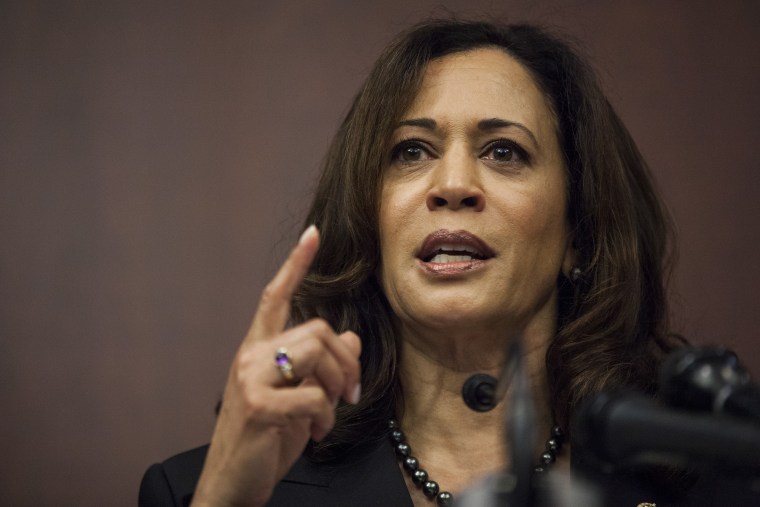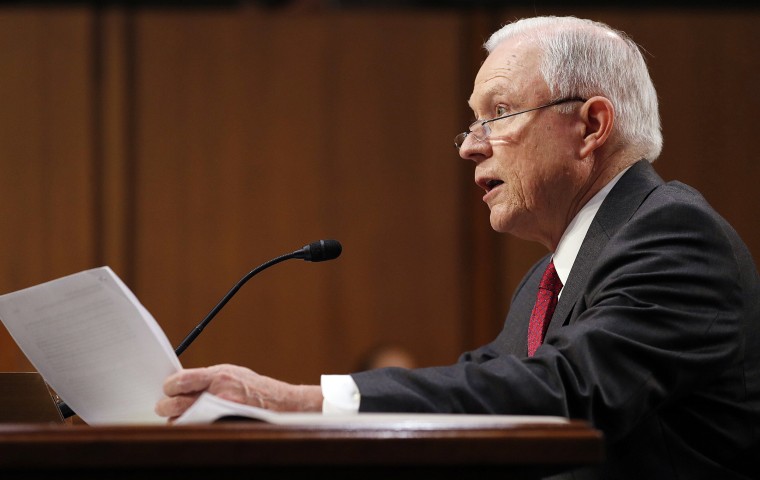Attorney General Jeff Sessions didn't answer a number of questions from senators during his testimony on Tuesday — but he didn't invoke executive privilege to avoid doing so.
He said only the president can use executive privilege to shield conversations from the public.
Sessions told the Senate Intelligence Committee he had a different reason for not answering certain questions: It's how such matters have been handled in the Justice Department for years.
"It's longstanding policy in the Department of Justice not to comment on conversations that the attorney general has had with the president of the United States for confidential reasons that really are founded in the co-equal branch powers of the Constitution of the United States," Sessions said.
That led to a series of frustrated and sometimes tense exchanges with critics of President Donald Trump on the panel, many of whom disputed the claims that Sessions had a solid legal basis for refusing to their answer their questions.
Sessions's first attempt to deflect the questions came in response to Sen. Mark Warner of Virginia, a Democrat who asked the attorney general if he had confidence in former FBI Director Robert Mueller's appointment as special counsel to probe whether the Trump campaign colluded with Russia.
Warner cited reports that a friend of Trump's suggested that he was considering removing Mueller from the investigation.
Sessions responded that he had confidence in Mueller. But he refused to discuss the reports at all "because I know nothing about the investigation."
Warner asked Sessions if he was evoking executive privilege. Sessions said no.
Executive privilege is a recognized power of the president to keep some conversations and material secret, even when requested by Congress or a court subpoena.
RELATED: Sessions says it is "appalling and detestable lie" to accuse him of collusion with Russians
The Supreme Court has upheld the power as a qualified privilege — meaning the president does have some power here, but it is not an absolute or automatic power to protect all secrets.
In the modern era, presidents have invoked the privilege for national security secrets, internal deliberations and during some court cases and investigations.
Most administrations, however, invoke it sparingly — the privilege was formally invoked once by Barack Obama, six times by George W. Bush and 14 times by Bill Clinton, according to the Congressional Research Service.
Less clear is the policy that Sessions invoked Tuesday.
“Unfortunately, the Attorney General repeatedly refused to answer pertinent questions from members of the Senate Intelligence Committee without offering a scintilla of a legal justification for doing so," said Senator Charles Schumer, who is not a member of the panel.
"This is part of a repeated and troubling pattern from Trump administration officials who clam up and refuse to answer questions about the Russia investigation, even though cabinet officials have had no qualms talking about their conversations with the President," he added.
The Justice Department said after the hearing that there is written guidance on disclosing conversations between the attorney general and the president. It was written by Washington, D.C., lawyer Ted Olson when he ran the department's Office of Legal Counsel.
Sessions told Sen. Angus King of Maine that Trump had not invoked executive privilege himself regarding matters explored by the committee on Tuesday.
"So, what is the legal basis for your refusal to answer these questions?" King, an Independent, asked.
Sessions replied: "I am protecting the right of the president to assert it if he chooses."
King said he was puzzled by that response.
"I don’t understand how you can have it both ways," King said. "The president can't not assert it and you’ve testified that only the president can assert it and yet I just don’t understand the legal basis for your refusal to answer."
Sessions responded that most Cabinet officials would do the same thing, although he did not cite any precedent for doing so.
RELATED: Sessions says FBI probe of Clinton emails should not have been publicly discussed
Sen. Kamala Harris of California, a Democrat, also pressed Sessions on the matter, asking if it was a written policy.
"I think so," Sessions said.

Harris followed up by asking if Sessions had reviewed the policy before the hearing since he knew it would be an issue. Sessions said he had discussed it with department lawyers.
The Republican National Committee released a statement detailing efforts by Obama administration officials to keep conversations involving the president private.
Obama Chief of Staff Jack Lew in 2012 refused to discuss consultations with Obama regarding a scandal involving the Bureau of Alcohol, Tobacco, Firearms and Explosives.
Another, the RNC pointed out, was Deputy National Security Adviser Ben Rhodes, who the White House refused to allow to testify to Congress on the sealing of a nuclear deal with Iran.
At the time, the White House cited "significant constitutional concerns" about maintaining the president's autonomy.
Legal expert Jonathan Turley said in an interview that Sessions didn't appear to do anything wrong, and that his refusal to answer questions was in line with what previous administrations have done.
"Communications that the attorney general had with president on this subject would fall squarely within the scope of executive privilege as invoked by both Democratic and Republican administrations," Turley said.
But Turley also said that the White House could have avoided the confrontation by formally invoking executive privilege ahead of time.
"There's no evidence that either side was looking for accommodation," he said. "They were prepared to have a confrontation, and they did."

